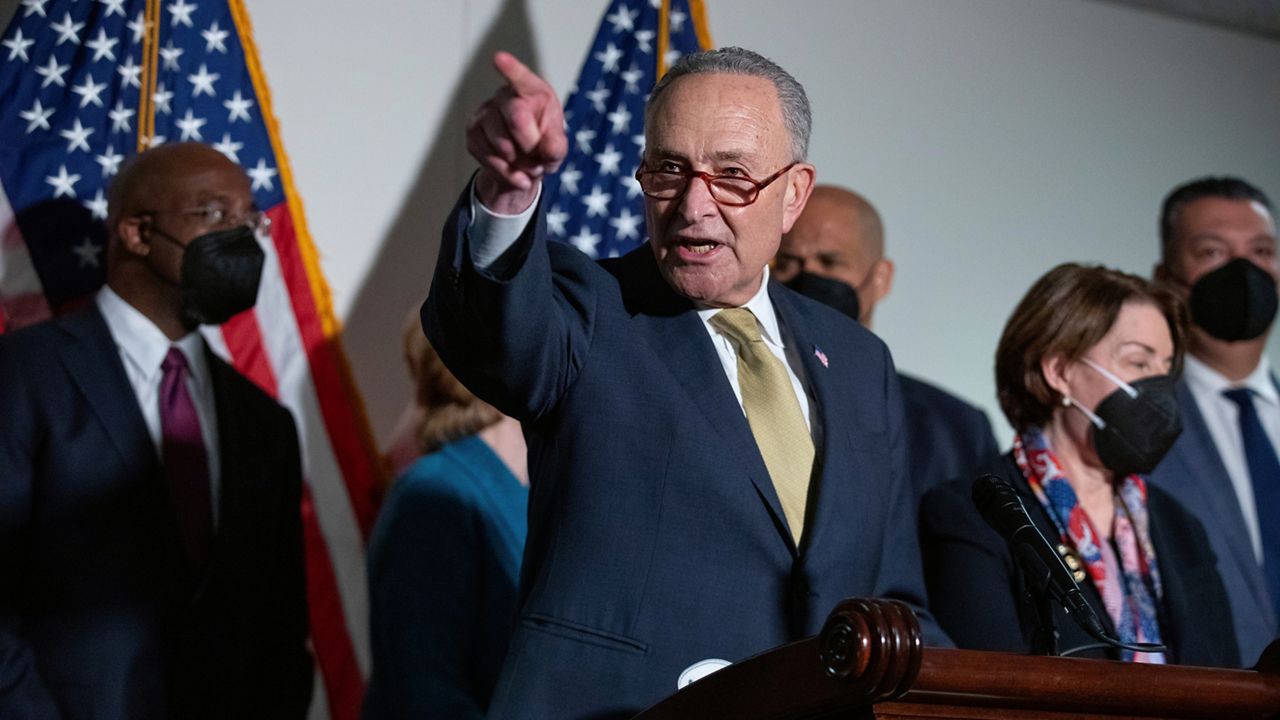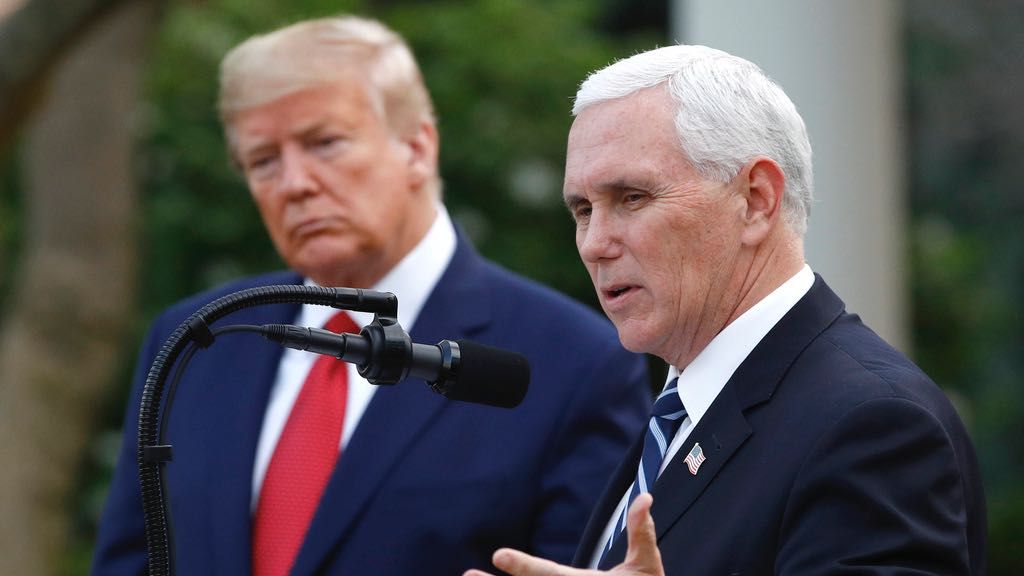For the fifth time in the last six months, Senate Republicans used the filibuster to block voting rights legislation, once again thwarting Democrats' efforts to enact election reform and protect access to the ballot box.
The final vote Wednesday night on the Freedom to Vote: John R. Lewis Act was 49-51, with Senate Majority Leader Chuck Schumer changing his vote from a "yes" to a "no" in a procedural move so the matter could be brought up again.
And even after a day of heated debate between Democrats and Republicans over the voting rights bill, Democrats were not able to change the Senate's rules to allow the measure to pass with a simple majority after moderate holdout Sens. Joe Manchin of West Virginia and Kyrsten Sinema of Arizona were unmoved.
"I am profoundly disappointed that the United States Senate has failed to stand up for our democracy," President Joe Biden said in a statement after the vote. "But I am not deterred."
At a press conference earlier Wednesday, Biden did not telegraph his strategy on what actions he would take if the vote to pass election reform fails, but suggested that this was not the end of his administration's voting rights push.
"My Administration will never stop fighting to ensure that the heart and soul of our democracy — the right to vote — is protected at all costs," Biden said. "We will continue to work with allies to advance necessary legislation to protect the right to vote. And to push for Senate procedural changes that will protect the fundamental right to vote."
"As dangerous new Republican laws plainly designed to suppress and subvert voting rights proliferate in states across the country, we will explore every measure and use every tool at our disposal to stand up for democracy," Biden pledged.
Vice President Kamala Harris, who is heading up the Biden administration's efforts on voting rights, also expressed her disappointment that "Senators voted to preserve an arcane Senate procedure rather than secure that fundamental freedom."
"The American people will not forget this moment," she said in a statement. "Neither will history."
"Our Administration will continue to fight to pass federal legislation to secure the right to vote," Harris wrote. "We will not stop fighting against the anti-voter legislation that Republican legislatures continue to push at the state level — and to champion and support state and local elected officials who work to enact pro-voter legislation."
The effort forced an important vote: Putting Republicans, and moderates, on the record on difficult votes, with the crucial 2022 midterm elections right around the corner.
"Absent a bill, the best you can do as Senate Majority Leader is put people on the record," Casey Burgat, who heads the legislative affairs program at The George Washington University, said in an interview with Spectrum News.
But that's not enough to satisfy voting rights advocates, nor Democrats, who have urged the Senate to do away with the filibuster in order to beat back a wave of restrictive voting legislation at the state level.
According to a tally from the Brennan Center for Justice, 19 states nationwide, largely with GOP-led statehouses, have enacted 34 laws that restrict access to the ballot box in the last year.
"This is a moral moment," Georgia Sen. Raphael Warnock, a staunch voting rights advocate, said Wednesday. "You cannot honor Martin Luther King and work to dismantle his legacy at the same time."
"I will not sit quietly while some make Dr. King the victim of identity theft," Warnock said in his stirring, powerful speech. "You do not get to offer praises in memory of Dr. King and then marshal the same kinds of states rights arguments that were used against Dr. King and against the civil rights movement."
“We have been summoned here by history,” he said. “This is not just another routine day in the Senate. This is a moral moment.”
But Warnock's words were not enough to sway Manchin and Sinema from their defense of the filibuster, and the vote failed 48-52, with the two moderates joining ever Senate Republican to kill the rule change.
In floor remarks on Wednesday, Manchin reiterated his support for the filibuster: "Eliminating the filibuster would be the easy way out. It wasn't meant to be easy."
"Allowing one party to exert complete control in the Senate with only a simple majority will only pour fuel on the fire of political whiplash and dysfunction that is tearing this nation apart," Manchin said. "You don't have to look very far to see how we're tearing ourselves apart. Every part of this country, people are divided now."
"I cannot support such a perilous course for this nation when elected leaders are sent to Washington to unite our country, not to divide our country," Manchin said. "We're called the United States, not the divided states, and putting politics and party aside is what we're supposed to do."
"Let this change happen in this way and the Senate will be a body without rules," Manchin said.
Manchin did open the door to a more tailored package of voting law changes — including to the Electoral Count Act, which was tested during the Jan. 6 riot at the U.S. Capitol — that he said a bipartisan group of senators are working on and could draw Republican support.
At his presser, Biden also predicted that “we will get something done on the electoral reform side of this,” signaling a willingness to come to a bipartisan compromise on the Electoral Count Act, which was challenged during the Jan. 6 riot at the U.S. Capitol.
Biden said he has "no reluctance" in regards to reaching out to Republicans to come to a bipartisan consensus on voting rights legislation, including Utah Sen. Mitt Romney and Senate Minority Leader Mitch McConnell.
“It's going to be difficult. I make no bones about that," Biden said of voting rights, but pledged: "We've not run out of options yet, and we'll see how this moves.”
“Senate Democrats are under no illusion that we face difficult odds,” Schumer admitted on Tuesday. “But I want to be clear: When this chamber confronts a question this important — one so vital to our country, so vital to our ideals, so vital to the future of our democracy — you don’t slide it off the table and say 'never mind.’"
“Republicans choose to continue their filibuster of voting rights legislation, we must consider — and vote on — the rule changes that are appropriate and necessary to restore the Senate and make voting rights legislation possible,” the majority leader added.
But Senate Minority Leader Mitch McConnell, R-Ky., on Wednesday accused Democrats of attempting to “use fear and panic to smash the Senate, silence millions of Americans, and seize control of our democracy.”
Minnesota Sen. Amy Klobuchar, one of the lawmakers who crafted the Freedom to Vote Act, attempted to refute the GOP claims that Democrats are manufacturing a crisis on voting rights.
"The voters, they know it's real," Klobuchar said.
McConnell called the filibuster “a central Senate tradition” and “the indispensable feature of our institution.”
“It makes the Senate serve its founding purpose: Forging compromise, cooling passions, and ensuring new laws earn broad support from a cross-section of our country,” McConnell said. “The Senate is not supposed to be a duplicate House of Representatives with fewer members and fancier desks. This body is not supposed to amplify huge swings in federal law with every election. It exists to slow those swings and bring stability.”
McConnell warned of a so-called “nuclear winter” in the Senate if Democrats weaken the filibuster: “Killing the legislative filibuster would hugely damage the Senate, but doing so by nuking the rules would destroy the Senate.”
It should be noted that McConnell and Senate Republicans utilized the nuclear option to confirm Neil Gorsuch to the Supreme Court in 2017 with a simple majority rather than the 60-vote legislative threshold, though Senate Democrats were the first to subvert the filibuster for presidential appointments (save for Supreme Court nominees) in 2013 when the GOP filibustered multiple nominees of then-President Barak Obama.
South Dakota Sen. John Thune, the no. 2 Republican in the Senate, said that if Republicans retake the chamber, they will not change the filibuster rules, citing the 34 times former President Donald Trump urged them to do so – unless Democrats do.
"We're not gonna do it, not if you don't," Thune said. "If you do, sure. Then it's all bets are off," saying that the Senate would become the House of Representatives if the filibuster is eliminated.
And Texas Sen. John Cornyn, another senior Republican in the chamber, warned that eliminating the filibuster would be a "slippery slope."
"Power is fleeting and at some point the shoe will always be on the other foot," Cornyn said of Democrats. "They’ll soon find themselves ruing the day their party broke the Senate."
The combined voting rights bill contains the Freedom to Vote Act and the John Lewis Voting Rights Advancement Act, two bills that have passed the House but were blocked by Senate Republicans.
The sweeping Freedom to Vote Act, which carries the crucial backing of Manchin, would make Election Day a national holiday, create a national standard for voter identification, crack down on long voting lines at polling places, expand mail-in voting and mandate states offer a minimum number of days for early voting. It would also outlaw partisan gerrymandering of resdistricting maps, overhaul campaign finance reform and make it a federal crime to harass or threaten election officials.
The John Lewis Voting Rights Advancement Act would update and restore provisions of the Voting Rights Act of 1965, which was gutted by the Supreme Court in separate decisions in 2013 and 2021. That bill was initially supported by every Senate Democrat and one Republican, Sen. Lisa Murkowski of Alaska.
Action on the bill comes as 19 states nationwide, largely with GOP-led statehouses, have enacted 34 laws that restrict access to the ballot box in the last year, according to the Brennan Center for Justice.
Senators spoke to a largely full chamber on Wednesday afternoon, a rare sight for floor speeches. Nearly every Senate Democrat, including Sinema and Manchin, was in attendance, though a large contingent of Republican senators were missing.
Washington Sen. Patty Murray noted that Republicans stepped aside to allow Democrats to pass an increase to the debt limit without GOP support last month, and noted that the Senate needs to change its procedures.
"I think it’s past time that we reform the filibuster to make sure the world’s greatest deliberative body actually deliberates the issues and challenges facing the American people," Murray said. "Because today, Senate procedure too often keeps us from that kind of deliberation."
Montana Sen. Jon Tester also made the point that the Senate needs to change its procedures by noting that the body has become "incredibly dysfunctional" in his time in Congress.
"I think the problem is we’ve gotten lazy," Tester said, adding that if Senators want to block bills, they need to step up and defend their positions.
"The last place I want to be is on the floor of the United States Senate trying to justify my position — I mean that’s a lot of work," Tester said. "Takes time. Takes effort. We’ve got to be forcing people to do that."
A talking filibuster, Tester said, "isn’t nuking the body, it’s not destroying the United States Senate."
A number of lawmakers invoked the violent Jan. 6 insurrection at the U.S. Capitol in their remarks about the importance of voting rights.
"We came dangerously close to to the kind of anti-democratic and authoritarian behavior that the United States has long decried of other nations," Michigan Sen. Gary Peters said, before appearing to take a shot at Republicans, as well as, perhaps, some members of his own party: "History will not be kind to the colleagues of mine who stand in the way of democracy."
Democrats were not the only ones to bring up the Jan. 6 riot, when a mob of Trump supporters stormed the Capitol to overturn the results of the election: Alaska Sen. Lisa Murkowski also appeared to invoke the insurrection, saying that the Senate needs to act to shore up Americans' faith in democracy.
"We don’t need, we do not need a repeat of 2020 when by all accounts our last president, having lost the election, sought to change the results," Murkowski said.
Murkowski, the only Republican to support the John Lewis Voting Rights Advancement Act, called for a bipartisan compromise on voting rights legislation, and even endorsed reforming the Electoral Count Act.
“I do believe this Senate should pass a reauthorization of the Voting Rights Act,” she said. “But I also believe that it must be a bipartisan effort."
Murkowski derided the partisan nature of Senate discourse and debate: "You’re either a racist or a hypocrite. Really, really? Is that where we are?”
Citing the success of bipartisan negotiations on the $1 trillion infrastructure bill, Murkowski said that "nobody believed we would be successful with that" and challenged her colleagues to "prove them wrong" on voting rights legislation.
"Elections and voting rights are so important, we understand that," she said. "Let's commit to resolving the issues that divide us, that will not only help bring this Congress closer together, but that just possibly, just hopefully ... can help heal this country, because that's what we need right now."
The Associated Press contributed to this report.








